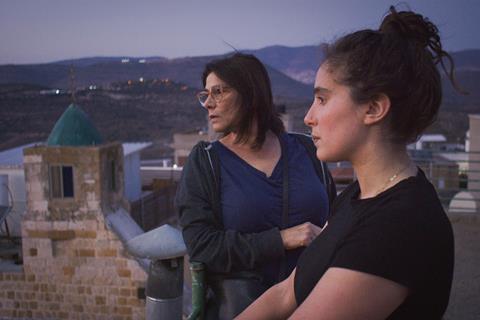Lina Soualem, daughter of Hiam Abbass, explores her family history in this personal documentary which won London’s Grierson award

Dir: Lina Soualem. France, Palestine, Belgium, Qatar. 2023. 82mins
The lives of four generations of Palestinian women reflect the history of an entire people in Bye Bye Tiberias. Filmmaker Lina Soualem’s sentimental journey with her actress mother Hiam Abbass becomes a powerful celebration of lives marked by separation, exile and erasure. An extensive festival journey already includes Venice and Toronto and should only expand after the film won the Grierson award at London. The current events in Gaza lend added poignancy to a highly personal perspective on the region.
A powerful celebration of lives marked by separation, exile and erasure
Hiam Abbass was just 23 when she defied her family and left her home village of Deir Hanna to pursue acting. A career that ranges from The Lemon Tree to The Syrian Bride and more recently Succession would carry her onwards to France and Hollywood. Her daughter Lina became a reason to return for summer holidays and a means of reconciliation. Lake Tiberias, also called the Sea Of Galilee, is central to the family’s memories. When Soualem was a child, Abbass would take her swimming there “as if to bathe me in her story”.
Soualem’s latest documentary gently probes her mother’s reasons for leaving but also seeks a multi-faceted portrait of Abbass’s own mother and grandmother, the lives they made for their loved ones and the restrictions that were imposed upon them. The portrait is pieced together from home movies, photos, archive footage, memories and emotional reunions. Things that could never be said in person were conveyed in letters and poems that Abbas is encouraged to read out loud.
The film brims with affection for Abbass’s mother Nemat, who raised 10 children and proudly continued her work as a teacher. Her grandmother Um Ali is equally formidable. Along with her husband and children, she was driven out of Tiberias in 1948 when the establishment of the state of Israel led to the displacement of 700,000 Palestinians. After her husband’s death, she was left with 8 children and ”a sewing machine to support them.” The family history is described as one of “vanished places and scattered memories.”
In making the film, Soualem is seeking to become the custodian of family memories. More than once, she creates a collage of photos, piecing together the fading connections that will soon be lost to the past. There is a sense that each family member who dies takes a fragment of history with them. At one point, the elderly Nemat tells her daughter they should “make the most of each other”.
Bye, Bye Tiberias retains the central focus of Abbas and the way she felt suffocated by her life in Deir Hanna. Her road to independence came in traditions she refused to accept and her defiance of family expectations. We see her returning to the El-Hakawati Theatre in Jerusalem where she began her acting career and taking to the stage to recreate pivotal confrontations with her father. Recalling the past is often a source of sorrow for Abbass but there is a clear joy in her love for her mother and close bond with her many sisters. She is one of ten who form the carriages of a train and play to the cameras as Soualem records a rare moment of her aunts and uncles together.
Like the women who came before her, Abbas felt obliged to leave everything behind and start anew. Similarly, newsreel footage and archive material from 1948 reveal abandoned homes, destruction and the casualties of history on the move to an uncertain future. Covering her family over these four generations, Soualem is able to subtly underline how everything changes and everything remains the same.
Production company: Beall Productions, Altitude 100 Productions, Philistine Films
International sales: Lightdox hello@lighdox.com
Producer: Jean-Marie Nizan
Screenplay: Lina Soualem, Nadine Naous, Gladys Joujou
Cinematography: Frida Marzouk, Thomas Bremond, Lina Soualem
Editing: Gladys Joujou
Music: Amine Bouhafa






![The Brightest SunScreen[Courtesy HKIFF]](https://d1nslcd7m2225b.cloudfront.net/Pictures/274x183/3/5/0/1448350_thebrightestsunscreencourtesyhkiff_312678.jpg)













![The Brightest SunScreen[Courtesy HKIFF]](https://d1nslcd7m2225b.cloudfront.net/Pictures/100x67/3/5/0/1448350_thebrightestsunscreencourtesyhkiff_312678.jpg)



